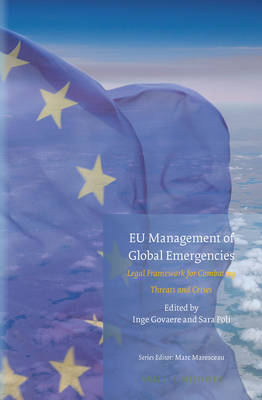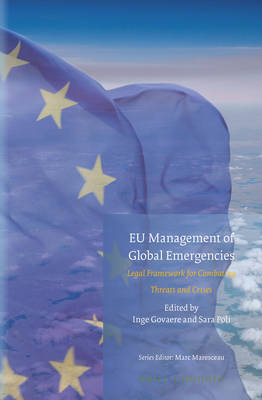
- Afhalen na 1 uur in een winkel met voorraad
- Gratis thuislevering in België vanaf € 30
- Ruim aanbod met 7 miljoen producten
- Afhalen na 1 uur in een winkel met voorraad
- Gratis thuislevering in België vanaf € 30
- Ruim aanbod met 7 miljoen producten
Zoeken
EU Management of Global Emergencies
Legal Framework for Combating Threats and Crises
€ 325,45
+ 650 punten
Omschrijving
EU Management of Global Emergencies: Legal Framework for Combating Threats and Crises provides a thorough analysis of the role played by the European Union (EU) in combating some of the global emergencies that currently affect, or are likely to affect, our planet. In particular, the potential of a "regional" model for coping with such emergencies is examined, taking into account the perceived inefficacy of traditional prevention and reaction mechanisms provided both by individual States and international organisations. The expression "global emergencies" refers to all situations, irrespective of the subject matter involved, which are characterised by an unexpected state of crisis which affects one or more regions of the world and call for an urgent and coordinated response from competent bodies and institutions.
Furthermore, the book tests the role of the EU in managing global emergencies with respect to four broad areas: the economic and financial crises, the protection of the environment, terrorism and humanitarian aid, while maintaining focus on the legal framework within which the EU deals with such global emergencies in the light of the innovations brought about by the Lisbon Treaty.
With contributions by leading experts in each of the identified set of challenges, EU Management of Global Emergencies: Legal Framework for Combating Threats and Crises aims at increasing the understanding of: (a) the contribution of regional organizations such as the EU to the management of global emergencies; (b) the effectiveness of the EU external action and the actual involvement of the EU in global cooperation processes against global emergencies; (c) global standards of human rights protection in relation to measures adopted in crises; and (d) the coordination mechanisms between the EU and other international organisations with a global or regional membership, in the management of global emergencies.
Furthermore, the book tests the role of the EU in managing global emergencies with respect to four broad areas: the economic and financial crises, the protection of the environment, terrorism and humanitarian aid, while maintaining focus on the legal framework within which the EU deals with such global emergencies in the light of the innovations brought about by the Lisbon Treaty.
With contributions by leading experts in each of the identified set of challenges, EU Management of Global Emergencies: Legal Framework for Combating Threats and Crises aims at increasing the understanding of: (a) the contribution of regional organizations such as the EU to the management of global emergencies; (b) the effectiveness of the EU external action and the actual involvement of the EU in global cooperation processes against global emergencies; (c) global standards of human rights protection in relation to measures adopted in crises; and (d) the coordination mechanisms between the EU and other international organisations with a global or regional membership, in the management of global emergencies.
Specificaties
Betrokkenen
- Uitgeverij:
Inhoud
- Aantal bladzijden:
- 448
- Taal:
- Engels
- Reeks:
- Reeksnummer:
- nr. 8
Eigenschappen
- Productcode (EAN):
- 9789004268326
- Verschijningsdatum:
- 20/06/2014
- Uitvoering:
- Hardcover
- Formaat:
- Genaaid
- Afmetingen:
- 157 mm x 236 mm
- Gewicht:
- 793 g

Alleen bij Standaard Boekhandel
+ 650 punten op je klantenkaart van Standaard Boekhandel
Beoordelingen
We publiceren alleen reviews die voldoen aan de voorwaarden voor reviews. Bekijk onze voorwaarden voor reviews.







